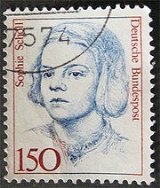
Sophie Scholl
Sophia Magdalena Scholl (9 May 1921 – 22 February 1943) was a member of the White Rose non-violent resistance movement during the Nazi regime in Germany. She was arrested on 18 February 1943, convicted of treason four days later, and executed by guillotine a few hours after that.
Sourced
- Somebody, after all, had to make a start. What we wrote and said is also believed by many others. They just don't dare express themselves as we did.
- Statement to the Volksgerichtshof [People's Court] of Judge Roland Freisler (21 February 1943)
- I am, now as before, of the opinion that I did the best that I could do for my nation. I therefore do not regret my conduct and will bear the consequences that result from my conduct.
- Response to the closing question of whether she hadn't "indeed come to the conclusion that your conduct and the actions along with your brother and other persons in the present phase of the war should be seen as a crime against the community, but in particular against our troops fighting arduously in the east, that merits the severest sentence?" Extracts from the examination transcripts, February 1943; Bundesarchiv Berlin, ZC 13267, Bd. 3 Online at bpb.de
Disputed
- Die Sonne scheint noch.
- The Sun still shines.
- These were her last words as depicted in the film, Sophie Scholl - The Final Days (2005), which was heavily based on Gestapo documents that were in East German archives and not released until 1990. Her last words have also been reported as "God, you are my refuge into eternity" or sometimes "Your heads will fall as well" but there is dispute over whether Sophie or her brother Hans had said this. Hans' last words have been reported as having been Es lebe die Freiheit! ["Long Live Freedom!"].
- The Sun still shines.
Quotes about Scholl and the White Rose
- It is possibly the most spectacular moment of resistance that I can think of in the 20th Century... The fact that five little kids, in the mouth of the wolf, where it really counted, had the tremendous courage to do what they did, is spectacular to me. I know that the world is better for them having been there, but I don't know why.
- Lillian Garrett-Groag in Newsday (22 February 1993)
- Of course, the terrible things I heard from the Nuremberg Trials, about the six million Jews and the people from other races who were killed, were facts that shocked me deeply. But I wasn't able to see the connection with my own past. I was satisfied that I wasn't personally to blame and that I hadn't known about those things. I wasn't aware of the extent. But one day I went past the memorial plaque which had been put up for Sophie Scholl in Franz Josef Strasse, and I saw that she was born the same year as me, and she was executed the same year I started working for Hitler. And at that moment I actually sensed that it was no excuse to be young, and that it would have been possible to find things out.
- Traudl Junge, Hitler's personal secretary, in Im toten Winkel - Hitlers Sekretärin (2002) [Blind Spot: Hitler's Secretary]
- The tolerant and open atmosphere of their childhood had enabled them to see through Hitler's platitudes at the Nuremberg Rally, when the brother and sister were members of Nazi youth organizations. Nearly all their peers were completely won over by the Führer, whereas Hans and Sophie had other, higher expectations of human nature, not shared by their comrades, against which they could measure Hitler.
- Alice Miller on Sophie and Hans Scholl's resistance to the social engineering of the Nazi regime, in Thou Shalt Not be Aware (1984).
- You can't really measure the effect of this kind of resistance in whether or not X number of bridges were blown up or a regime fell... The White Rose really has a more symbolic value, but that's a very important value.
- Jud Newborn in in Newsday (22 February 1993)
